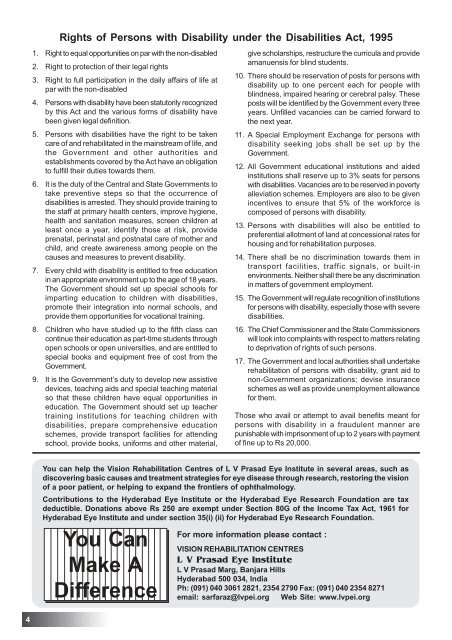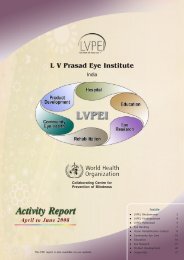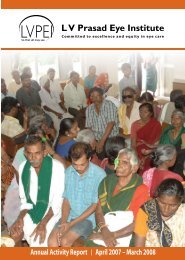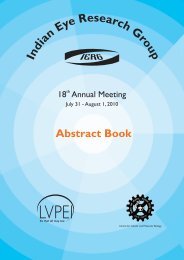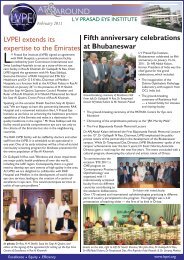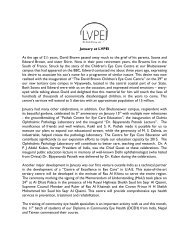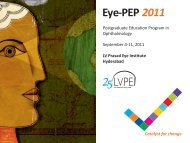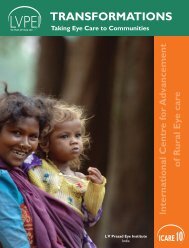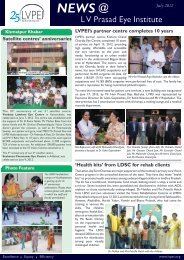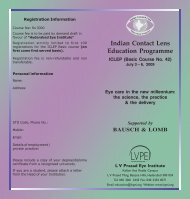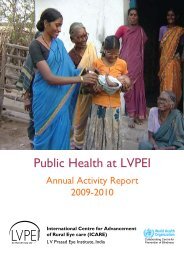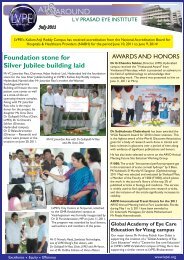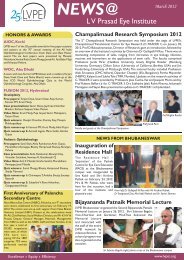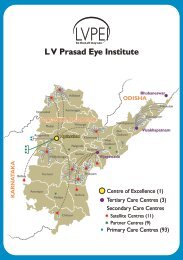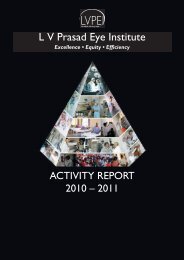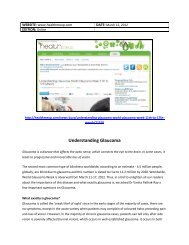Newsletter 16 - Patient Care Services - LV Prasad Eye Institute
Newsletter 16 - Patient Care Services - LV Prasad Eye Institute
Newsletter 16 - Patient Care Services - LV Prasad Eye Institute
Create successful ePaper yourself
Turn your PDF publications into a flip-book with our unique Google optimized e-Paper software.
Rights of Persons with Disability under the Disabilities Act, 1995<br />
1. Right to equal opportunities on par with the non-disabled<br />
2. Right to protection of their legal rights<br />
3. Right to full participation in the daily affairs of life at<br />
par with the non-disabled<br />
4. Persons with disability have been statutorily recognized<br />
by this Act and the various forms of disability have<br />
been given legal definition.<br />
5. Persons with disabilities have the right to be taken<br />
care of and rehabilitated in the mainstream of life, and<br />
the Government and other authorities and<br />
establishments covered by the Act have an obligation<br />
to fulfill their duties towards them.<br />
6. It is the duty of the Central and State Governments to<br />
take preventive steps so that the occurrence of<br />
disabilities is arrested. They should provide training to<br />
the staff at primary health centers, improve hygiene,<br />
health and sanitation measures, screen children at<br />
least once a year, identify those at risk, provide<br />
prenatal, perinatal and postnatal care of mother and<br />
child, and create awareness among people on the<br />
causes and measures to prevent disability.<br />
7. Every child with disability is entitled to free education<br />
in an appropriate environment up to the age of 18 years.<br />
The Government should set up special schools for<br />
imparting education to children with disabilities,<br />
promote their integration into normal schools, and<br />
provide them opportunities for vocational training.<br />
8. Children who have studied up to the fifth class can<br />
continue their education as part-time students through<br />
open schools or open universities, and are entitled to<br />
special books and equipment free of cost from the<br />
Government.<br />
9. It is the Government’s duty to develop new assistive<br />
devices, teaching aids and special teaching material<br />
so that these children have equal opportunities in<br />
education. The Government should set up teacher<br />
training institutions for teaching children with<br />
disabilities, prepare comprehensive education<br />
schemes, provide transport facilities for attending<br />
school, provide books, uniforms and other material,<br />
give scholarships, restructure the curricula and provide<br />
amanuensis for blind students.<br />
10. There should be reservation of posts for persons with<br />
disability up to one percent each for people with<br />
blindness, impaired hearing or cerebral palsy. These<br />
posts will be identified by the Government every three<br />
years. Unfilled vacancies can be carried forward to<br />
the next year.<br />
11. A Special Employment Exchange for persons with<br />
disability seeking jobs shall be set up by the<br />
Government.<br />
12. All Government educational institutions and aided<br />
institutions shall reserve up to 3% seats for persons<br />
with disabilities. Vacancies are to be reserved in poverty<br />
alleviation schemes. Employers are also to be given<br />
incentives to ensure that 5% of the workforce is<br />
composed of persons with disability.<br />
13. Persons with disabilities will also be entitled to<br />
preferential allotment of land at concessional rates for<br />
housing and for rehabilitation purposes.<br />
14. There shall be no discrimination towards them in<br />
transport facilities, traffic signals, or built-in<br />
environments. Neither shall there be any discrimination<br />
in matters of government employment.<br />
15. The Government will regulate recognition of institutions<br />
for persons with disability, especially those with severe<br />
disabilities.<br />
<strong>16</strong>. The Chief Commissioner and the State Commissioners<br />
will look into complaints with respect to matters relating<br />
to deprivation of rights of such persons.<br />
17. The Government and local authorities shall undertake<br />
rehabilitation of persons with disability, grant aid to<br />
non-Government organizations; devise insurance<br />
schemes as well as provide unemployment allowance<br />
for them.<br />
Those who avail or attempt to avail benefits meant for<br />
persons with disability in a fraudulent manner are<br />
punishable with imprisonment of up to 2 years with payment<br />
of fine up to Rs 20,000.<br />
You can help the Vision Rehabilitation Centres of L V <strong>Prasad</strong> <strong>Eye</strong> <strong>Institute</strong> in several areas, such as<br />
discovering basic causes and treatment strategies for eye disease through research, restoring the vision<br />
of a poor patient, or helping to expand the frontiers of ophthalmology.<br />
Contributions to the Hyderabad <strong>Eye</strong> <strong>Institute</strong> or the Hyderabad <strong>Eye</strong> Research Foundation are tax<br />
deductible. Donations above Rs 250 are exempt under Section 80G of the Income Tax Act, 1961 for<br />
Hyderabad <strong>Eye</strong> <strong>Institute</strong> and under section 35(i) (ii) for Hyderabad <strong>Eye</strong> Research Foundation.<br />
You Can<br />
Make A<br />
Difference<br />
For more information please contact :<br />
VISION REHABILITATION CENTRES<br />
L V <strong>Prasad</strong> <strong>Eye</strong> <strong>Institute</strong><br />
L V <strong>Prasad</strong> Marg, Banjara Hills<br />
Hyderabad 500 034, India<br />
Ph: (091) 040 3061 2821, 2354 2790 Fax: (091) 040 2354 8271<br />
email: sarfaraz@lvpei.org Web Site: www.lvpei.org<br />
4


